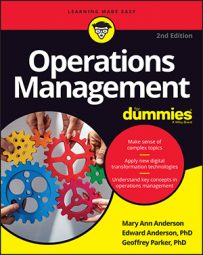What makes a company world class, or the best at what it does? A firm’s operations are a pivotal element in what customers experience. Consumers can say why they like a certain product or service — and why they don’t. Operations spend company money, interface with customers, and make achieving business goals possible.
So what makes the operations behind a product or service world class? Consider these common characteristics of companies that are generally considered to be world class.
Know thyself
Successful companies have an intimate understanding of what they do well and what they don’t do so well. They know their competencies and exploit them to get ahead of their competitors. This objective self-assessment is particularly critical for operations. They also realize what they don’t know and outsource those items.
Companies that have well-documented processes and procedures in place to measure performance and control their processes are a giant step ahead of competitors that don’t. Just keep in mind that knowing one’s own processes doesn’t mean that said processes are flawless; it just means that the company is aware of the status quo. You know where the blemishes are, and you’re potentially working to improve them.
Possess profound knowledge of the customer
Companies that fully and genuinely realize that their customers are the lifeblood of the business know that they must provide the product and services that customers want, when they want them, and at a price they’re willing to pay. Successful companies know who their customers are and what those customers expect from their product or service. They aim efforts at improving the customer experience and are rewarded with loyal customers.
Focus intensely on quality
When companies know that quality is what their customers say it is and devote their efforts to ensuring that products and services meet customer requirements, then customers are happy.
World-class businesses realize that disappointed customers are more vocal about their displeasure than satisfied customers are about their satisfaction. One bad experience with a product can cause a company to lose a customer forever, and a tarnished reputation is difficult to repair. If you need proof, just take a look at customer product reviews on any website.
Quality is built into the process of well-built products and carefully considered services. Quality is woven into world-class operations. Effort invested in improving quality is rewarded with increased customer satisfaction.
Adapt to change
The only certainty in business is change. Everything changes, and world-class operations are ready to adjust to changes in the business environment. Companies face technology shifts that make current products obsolete; new competitors enter the marketplace; and evolving customer requirements require changes to product specs, timing, and other elements of the output. World-class companies are agile enough to adjust their processes to accommodate changes in the business environment.
Get better all the time
Some companies know that they always have room for improvement, and they continuously strive to get better. These companies benchmark competitors and other businesses outside their industry to find better ways to do things, and they utilize some form of the plan-do-check-act cycle (find details on process improvement tools in Part III). These good habits of operations management enable firms to identify problems quickly and implement improvements.
Appreciate employees
When a company is truly dedicated to the people who create and deliver its products and services — and demonstrates its appreciation — it is rewarded with a workforce dedicated to the success of the company. A highly motivated workforce that’s properly compensated tends to produce the best quality products and provide the best service to customers.
Today’s workforce seems to know that compensation isn’t strictly the size of a paycheck; people also care about how they’re treated on the job. Training, adequate resources, career advancement opportunities, and recognition for a job well done are important aspects of being appreciated as employees.
Pay constant attention to product offerings
Choosing the types of products and services to offer in the marketplace is a critical decision for most businesses. Realizing that customers are not alike, companies often offer a portfolio of products. You’ve probably encountered this. Individual companies offer a range of products — from DVD players to refrigerators — to appeal to various types of consumers. Successful firms realize that different market segments shop and buy according to different requirements.
Use relevant process metrics
Companies that know the importance of measuring process performance and can identify the few core metrics that drive their success avoid the analysis paralysis that some firms experience when they collect too much unnecessary data. Focusing only on metrics that drive customer satisfaction and reduce costs enables companies to provide products that customers want at prices that generate profit.
Balance respect and expectations for the supply chain
Making sure that suppliers are well trained and involved in company processes, even during process development, demonstrates a firm’s appreciation for its supply chain. Long-term relationships with key suppliers are essential to assuring that suppliers are invested in the company’s success. And it helps if the company shares its success with the supply chain businesses because this creates a win-win situation for everyone involved.
In exchange, operations should expect that suppliers will have the company’s best interest at heart and make their best efforts to provide the quality, price, delivery, and responsiveness the business needs to succeed.
Avoid unnecessary complexity
Unnecessary complexity in operations generates confusion and adds more places where things can go wrong. It increases the difficulty of managing processes, even in the best of circumstances. Disruptions in the form of absentee workers, broken machines, missing raw material, weather delays, and more occur all the time in operations.
Adaptability and contingency planning are hallmarks of best-in-class operations. Design of robust processes that can handle disruptions well, and planning for contingencies like adequate spare parts or an on-call list of workers, can help mitigate disruptions.

